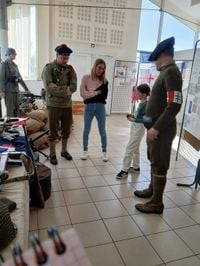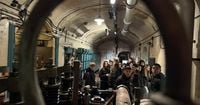As the world marks the 80th anniversary of the liberation of Auschwitz, two prominent intellectuals, historian Annette Wieviorka and playwright Jean-Claude Grumberg, reflect on the significance of this historical moment and the future of Auschwitz's remnants. Their insights were shared during a recent episode of the podcast 'Le Grand Atelier' on France Inter, aired on March 30, 2025.
The liberation of the Auschwitz-Birkenau concentration and extermination camp on January 27, 1945, revealed the horrors of the Nazi regime, where over one million individuals lost their lives. Wieviorka, whose own family history is intertwined with this tragedy—her paternal grandparents, Polish Jews, were arrested in Nice during the war—has dedicated her career to studying the Holocaust and Jewish history. She became agrégée d'histoire in 1989 and earned her doctorate in 1991 with her thesis titled "Deportation and Genocide: Between Memory and Oblivion." Currently, she serves as the vice-president of the Conseil supérieur des archives, a position she has held since 2019.
In her latest work, "Itinérances," published by Albin Michel, Wieviorka offers a unique perspective, described as a form of "professional introspection." The book chronicles her journey through significant locations tied to her family's history and the broader narrative of the Holocaust, including Paris, Warsaw, Drancy, Auschwitz, Nuremberg, Jerusalem, Ivry-sur-Seine, and New York. It is a deeply personal account that intertwines her memories with those of her ancestors, capturing the essence of a shared history that profoundly impacted her life.
Wieviorka's exploration goes beyond personal reflection; it delves into the collective debates of the 1990s regarding what should become of Auschwitz's remains. She emphasizes the importance of preserving the meaning of the term "Auschwitz," which not only signifies a historical fact but also embodies the devastation of European Jewry and the embodiment of evil in history.
Joining Wieviorka in this reflection is Jean-Claude Grumberg, a major figure in contemporary theater. Born in 1939, Grumberg's life and work are heavily influenced by the memory of World War II, particularly the loss of his father, who perished in deportation. His diverse career began with various jobs, including tailoring, before he transitioned to acting with the Jacques Fabbri company. Grumberg's play "Zone libre" (1990) recalls his childhood experiences during the Occupation, showcasing his ability to weave personal narratives with broader historical contexts.
In his latest book, "Quand la terre était plate" (Seuil), Grumberg portrays his mother, Suzanne, who was born in Paris in 1907. The narrative reflects on two world wars and a century marked by suspicion, expulsion, exile, and pogroms, all while highlighting the absurdity amid the horror. Grumberg's storytelling is both poignant and tender, capturing the struggles of a single mother raising her two sons after the disappearance of their father.
Grumberg acknowledges the challenges of recounting a true story, especially when the details are hazy. He articulates the difficulties of narrating his family's history—the deportation of his father, the exile of his family, and the stories of survivors that resonate with his own experiences. His recent publication continues this exploration, following the success of his previous book, "La Plus Précieuse des Marchandises," which was adapted into an animated film by Michel Hazanavicius.
In addition to their reflections on the Holocaust, the podcast episode also highlights cultural events commemorating this significant anniversary. The community of communes in Pays de Bitche has engaged young generations in commemorating the 80th anniversary of the Liberation, with approximately 1,100 middle school students from Bitche, Lemberg, and Rohrbach-lès-Bitche visiting the Simserhof ouvrage between March 17 and March 28.
Furthermore, an exhibition commemorating World War II events in Charente-Maritime, particularly in Champagne, took place on March 29 and 30, 2025. This exhibition attracted around 100 visitors and featured 20 kakémonos created by the Archives départementales. Mayor Roland Clochard expressed gratitude to the Département for lending the exhibition and acknowledged the contributions of various local historians and associations.
The exhibition covered significant topics, including the La Pallice submarine base, the presence of 400,000 German soldiers stationed south of the Loire, the reorganization of the Resistance in 1943, and the tragic fates of individuals arrested during the war. Many of those arrested were shot in January 1944, and the exhibition served as a poignant reminder of the sacrifices made during the conflict.
As the discussions surrounding the legacy of Auschwitz and the broader implications of World War II continue, both Wieviorka and Grumberg's works serve as vital contributions to understanding our shared history. Their reflections not only honor the memories of those lost but also challenge future generations to engage with this history thoughtfully and meaningfully.
In a world where the lessons of the past are increasingly relevant, the importance of preserving memory and understanding the complexities of history cannot be overstated. As Wieviorka and Grumberg demonstrate, storytelling remains a powerful tool for both remembrance and education, ensuring that the horrors of the past are never forgotten.







